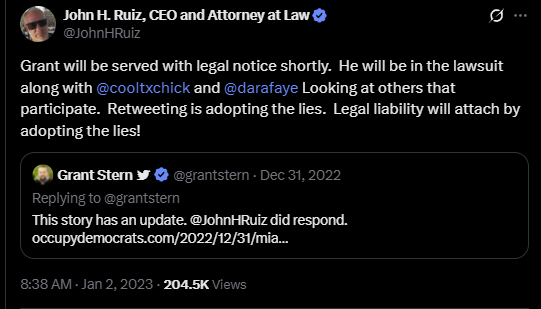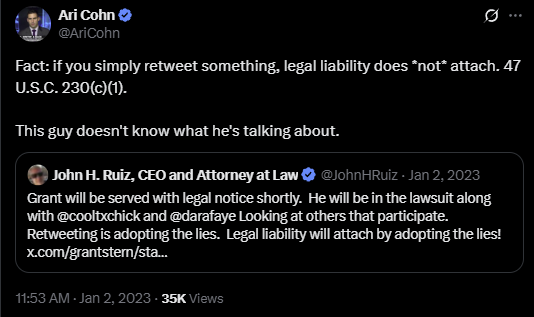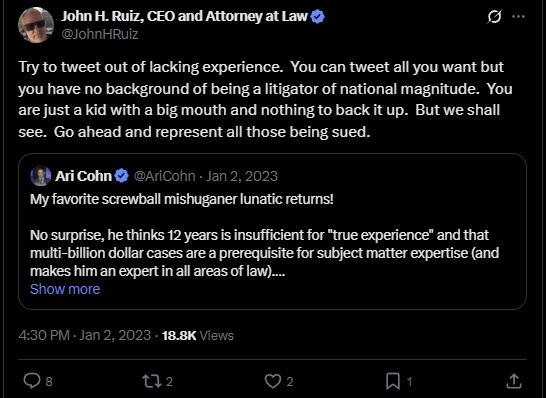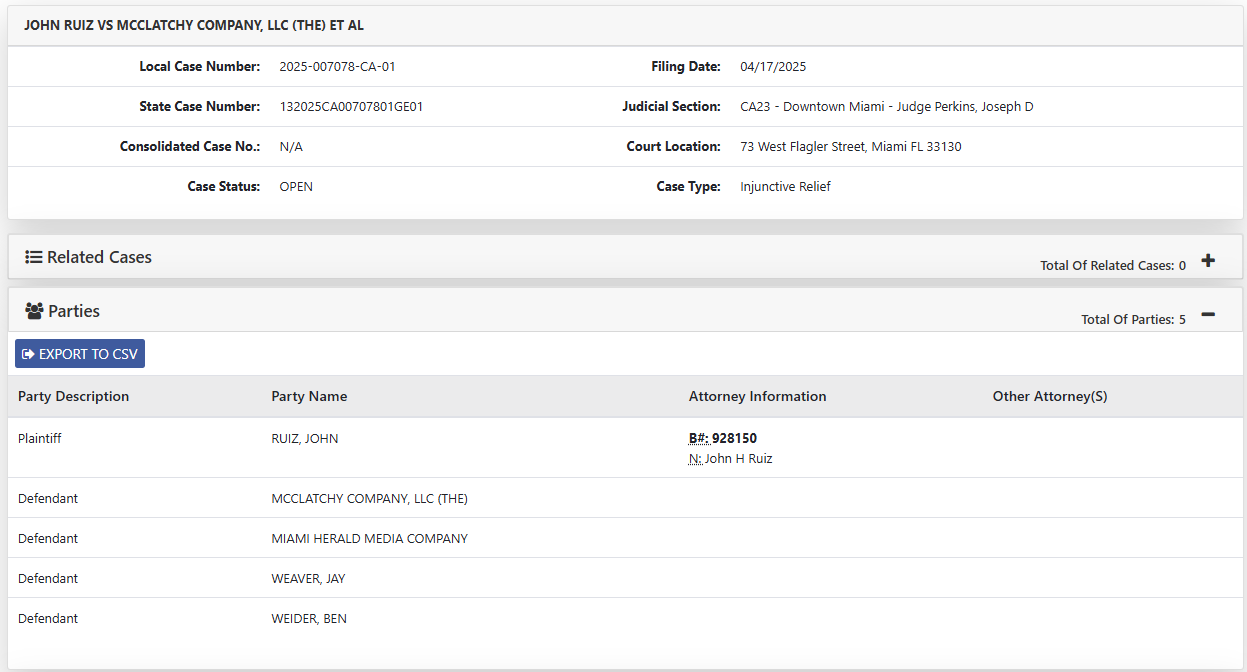Defamation Dipshittery of National Magnitude
John Ruiz continues to go big in the bad way
John Ruiz talks a big game. Whether it’s his company, MSP Recovery (briefly changed to LifeWallet and then back again—I use MSP Recovery even for events that happened during the name change), his NIL deals for University of Miami Athletics, or his (alleged) skills as an attorney, if you ask John Ruiz you get an answer ripped from the Donald Trump Puffery Playbook: everything is the greatest you’ve ever seen, and so is he.
The reality is…significantly less impressive.
MSP Recovery (which makes money pursuing reimbursement for insurance payments that should have been paid by someone else) went public in 2022 via the often scammy SPAC route at a valuation of $32.6 billion, projecting that its pre-tax share of the recoveries would be $963 million in 2023, and $3.25 billion in 2024 (see the chart on page 208). But it only collected $7.2 million in 2023, and $18.1 million in 2024. It appears now that the company thinks it may not be able to go on for much longer.
As for his legal acumen, let’s just say I have had my…doubts…for a while now. Back in 2023, Ruiz took exception to an article linking him and/or his family members to disgraced former Congressman George Santos. But not only did he threaten to sue the author of the article, Ruiz also issued a bumptious threat to sue anyone who retweeted the article:
Not being one to let rich bullies threaten abusive litigation over speech they don’t like, I pointed out that Section 230 protects users who merely retweet allegedly defamatory content:
John Ruiz, like any self-obsessed egomaniac, did not take kindly to this. What followed was a days-long Twitter exchange during which he told me he was a “litigator of national magnitude” and that I am a “kid” who has only been practicing for 12 years and has no idea what he’s talking about, and I made fun of his deficient legal understanding and self-importance:
In a predictably foolish turn of events, Ruiz then started threatening me, telling me my tweets violated the Rules of Professional Conduct. It didn’t work. But did John just chalk it up to a failed attempt to intimidate me and go on with his life? Of course not.
A few weeks later, I got an email from Illinois’ Attorney Registration and Disciplinary Commission, attached to which was a copy of the 126 page bar complaint from John H. Ruiz, alleging that being mean to him on the Internet is “prejudicial to the administration of justice” in violation of Rule 8.4 and that “Contrary to Mr. Cohn’s conviction, he does not have a free-speech right to leave insulting, harassing, and profane-ridden posts on anyone’s Twitter account.”
Lol. Lmao, even.
That same ARDC email politely (and entirely unsurprisingly) informed me that the complaint had been summarily dismissed without investigation. For some fun excerpts from the complaint, check out this thread.
It will not shock you to learn that the threatened lawsuits did not materialize, depriving us all of witnessing the colossal courtroom ass-whooping that Ruiz had coming to him. But last week, the universe—perhaps sensing that we could all use a little pick-me-up in these serious and troubled times—came through.
On April 17, Ruiz decided to try his hand at defamation litigation after all, this time against the Miami Herald and two of its reporters over its coverage of his company’s ongoing woes.
To paraphrase former Arizona Cardinals coach Dennis Green: “He is who we thought he was.”
Let’s have a look.
Who even wrote this thing?
The complaint is signed by attorneys from the law firm of Armas Bertran Zincone, as well as one of MSP Recovery’s lawyers (more on that in a moment). But it reads like a John Ruiz job to me, complete with all the self-aggrandizement you might expect, including more than two full pages of bullet points about completely irrelevant and bizarre things, such as its HIPAA compliance (?).
It also repeatedly misspells one of the defendant’s names, and has a very clearly copy-paste paragraph (82) from a different complaint that is not only duplicative of a previous paragraph (22), but also claims that the defendants “refused to retract the open letters,” when this case is about newspaper articles. Adding stupidity to weirdness, under the first count, the complaint defines defamation in a way that can only be described as “unsatisfactory 1L legal writing memo”:
Ah, so defamation is a cause of action that occurs when a statement defames someone. Actually what happened here is that he used the definition of “defamation by implication” from a 4th Circuit case to define defamation in general to a Florida court. Big time litigator, folks. 7-D Litigation Parcheesi.
Along with the other, bigger issues I will discuss below, this reads a lot like Ruiz’s slapdash, incompetent attempt at a bar complaint against me.
My suspicion is deepened by the fact that the Miami-Dade court records system lists the attorney for John Ruiz as…John Ruiz. No other attorneys, not even the ones who signed the complaint, are listed.
That would certainly explain some things.
Where’s the defamation?
Here’s where things get really fun. There are a few allegations in the complaint, and not all of them are particularly clear. But let’s start with what is clear.
“Target of federal and civil criminal investigations”
In the section of the lawsuit titled “Miami Herald Article Defames MSP Recovery” (this will be be important later), Ruiz alleges that it was defamatory to publish the statement that “Ruiz and his health insurance claims company . . . are the target of federal civil and criminal investigations.”
You might think to yourself, “Well, if there is no investigation then I can certainly see how that could be defamatory.” And you would be right.
Except that’s not what Ruiz is saying.
You see, MSP Recovery admits (as it must) that there is an investigation. In April 2024, the company’s annual report revealed that both the SEC and DOJ had subpoenaed company records relating to historical and projected financial results, investor agreements, propriety algorithms, and the drop in the company’s stock price after it went public. And its retraction demand to the Miami Herald, MSP Recovery’s lawyer wrote: “The facts only establish that the DOJ and SEC are investigating [MSP Recovery].”
So why the defamation claim?
Because Ruiz alleges that while the investigations exist, MSP Recovery isn’t technically a “target.” If that sounds stupid, it’s because it is.
Ruiz bases the entire claim on the DOJ’s Justice Manual, which defines a “target” as
a person as to whom the prosecutor or the grand jury has substantial evidence linking him or her to the commission of a crime and who, in the judgment of the prosecutor, is a putative defendant.
The complaint makes the pitch for defamation:
51. At the time of publishing the article and today, to the best of the Company’s knowledge, the Department of Justice has not issued any target letters to anyone associated with the Company because of this investigation.
As a result, the complaint alleges, calling Ruiz and MSP Recovery “targets” falsely asserts that there is substantial evidence linking them to a crime.
Just a couple problems there.
First, the Justice Manual defines “target” in the context of outlining the policies and procedures for issuing subpoenas to testify before a grand jury. If a “target” is called to testify, DOJ policy is to notify them that they are a target (which gives them an opportunity to consider invoking their Fifth Amendment rights).
What that does not mean is that absence of a target letter means one is not a target. Notification is not required unless the person or entity is being asked (or subpoenaed) to testify. Target letters can show up at any time, sometimes near the end of the grand jury investigation as a courtesy. And not every target is called to testify; the majority of people indicted are never sent a target letter. So at a bare minimum, the complaint doesn’t even really meaningfully allege falsity.
Second, and notwithstanding the particular context of target letters, the alleged distinction between “target” and “person under investigation” is a profoundly flimsy (and whiny) hook for a defamation claim.
For a defamation claim to survive under Florida law, the complained-of statement has to be “reasonably capable of a defamatory interpretation."
There are some terms of art that may be such uncommon parlance that anyone reading them would understand them to be referring to some technical meaning. The word “target” is certainly not one of them. The phrase “target of an investigation” is commonly (to understate the matter) used in the colloquial sense to refer to the person or entity being investigated. Most people aren’t even aware that the Justice Manual exists, let alone how it defines “target.” The argument that the general readership of the Miami Herald would read the word “target” and think that it meant the Justice Manual’s definition is about as far from reasonable as possible.
Rather, any reasonable reader would understand that “target” was meant in its ordinary usage: that MSP Recovery is being investigated. And that is undeniably true. And when a statement is true, or substantially true (i.e., while the statement itself is not perfectly accurate, the “gist” or the “sting” is true), a defamation claim necessarily fails.
Florida courts have used the substantial truth doctrine to shield defendants from exactly this kind of nitpicking over legal terms of art. Particularly because newspapers and media outlets, which are “geared for public consumption.” the courts have ruled that requiring them to correctly use formal legal terminology instead of common parlance would make covering the legal system perilous and chill protected speech.
And that’s exactly what Ruiz is trying to do here. I would say it was too cute by half, but really it’s just ugly as sin.
Miami Herald reporting on lawsuit against MSP Recovery
The lawsuit has an entire section devoted to a lawsuit brought against MSP Recovery by Cano Health and why it is allegedly baseless, which seems weird at first given that Cano is not a party to this suit. But then you get to the next section, and all becomes clear:
74. On August 16, 2023, The Herald publishes another article regarding the CANO lawsuit, with defamatory language taken from the false allegations made by CANO.
Strangely, this particular claim does not make it into any of the counts, so I’m left wondering whether Ruiz is actually claiming that this is defamation. But with him, it’s best to assume that the stupidest answer is the correct one.
The Miami Herald article describes the claims in the lawsuit. As a general matter, that should be enough. It is a true statement of fact that those are the allegations Cano made. And statements that are true are not actionable.
But in addition, the sentence itself almost defeats the claim. In Florida, the fair report privilege shields media defendants from defamation lawsuits on the basis of its reporting on information received from government officials, including court proceedings and public records (like a complaint in a lawsuit). That privilege can only be overcome when the report is not a “reasonably accurate and fair” description of the document or proceeding.
When you’re describing the allegations in a lawsuit, it’s hard to get more “reasonably accurate” than using language from the complaint. And that’s what the Miami Herald did. It wrote an article that detailed the allegations, as well as the lawsuit that MSP Recovery filed against Cano. I’m sure that in his addled brain, John Ruiz thinks that summarizing the allegations of a lawsuit he deems baseless is defamatory. But this is precisely the situation that the fair report privilege was created for: to prevent abusive blowhards like John Ruiz from silencing reporting on litigation against them.
Pretty much every lawsuit has a defendant that disputes the truthfulness of the complaint. If the Miami Herald’s article is actionable, it is simply not possible to report on any litigation.
I’m starting to continue to think that John Ruiz doesn’t know a damn thing about defamation law.
The Consequences of My Own Actions (Defamation by Implication)
Ruiz claims that a July 31, 2023 article in the Miami Herald defamed him by implication.
Defamation by implication is the juxtaposition of true facts, or omission of facts, in a way that creates a defamatory impression. So if, for example, a newspaper reported that there has been an outbreak of goat-fucking in Miami, and then conveniently mentioned that John Ruiz was seen walking a bowlegged goat on a leash in Bayfront Park, there might be a claim for defamation by implication.
And Florida does in fact recognize defamation by implication as a viable claim—but the good news ends there for John Ruiz. Let’s have a little look at the specifics (such as they are):
a. That Plaintiff and his company, Lifewallet, are the “target” of federal criminal and civil investigations by the SEC, FBI, IRS, and U.S. Attorney’s Office, suggesting Plaintiff engaged in illegal or unethical conduct.
Again, for the reasons I discussed above, no. The statement and implication here are the same: you’re being investigated by the feds. And that’s true. It is the people who are investigating you who think you might possibly have engaged in illegal conduct, not the person reporting on the investigation.
d. That Plaintiff misrepresented the financial health of his company to investors, resulting in "red flags on top of red flags," according to a quoted source.
This barely makes sense. Here’s the full quote from the story: “Even more telling, LifeWallet’s recent financial filings with the SEC constitute “red flags on top of red flags,” said Richard Hong, a seasoned litigator who worked more than 25 years for the U.S. Attorney’s Office in Miami and the Justice Department in Washington, D.C., as well as the SEC”
That’s not defamation by implication. That’s an opinion by Hong about the financial health of your company. Defamation by implication can only arise from “literally true facts,” not opinions. It’s unclear that Ruiz (and/or whoever actually wrote this incompetent document) is aware of what this cause of action actually is.
b. That Plaintiff has a history of financial irresponsibility, recklessness, and dishonesty, as evidenced by references to foreclosures, tax liens, and failed ventures
e. That Plaintiff’s business practices were fraudulent or incompetent, as suggested by repeated emphasis on delayed financial filings, declining stock value, and risk of Nasdaq delisting.
This is just really stretching into “these are the things I am insecure about because I think them of myself” territory here. If someone reads about your foreclosures, tax liens, and failed ventures and conclude that you have a history of financial irresponsibility or recklessness, you know what that would be? An opinion based on facts. Disclosed facts, even! Defamation by implication requires that the implication itself be defamatory. Which means it has to be factual. That someone might draw an opinion of you and your actions from reading true facts is not something that defamation law can redress. The solution to that is to not be such a fragile turd.
And Ruiz cannot turn accurate reporting about his company’s plummeting value, delayed filings, and de-listing notification into defamation just by saying it “implies” fraud. No, it means your company is in trouble and has been showing signs of being in trouble. Which is exactly what the article said. Let’s not mince words: Ruiz isn’t trying to combat defamatory implications. He’s trying to silence criticism because you might think (and justifiably so) bad things about him and, to him, any criticism of anything he or his company does constitutes a personal attack on his very being—and that certainly can’t be allowed any more than I can be allowed to make fun of him on twitter dot com.
You’ll notice I left one entry (subsection c on the list) off. That suffers from the same problems as the others, but hold on to it for just a minute because there’s more.
What does he want?
Well primarily he really wants to be Donald Trump. But that role has been filled. So the lawsuit asks for a couple of things.
The first is injunctive relief. Plaintiffs have sought this before, and it usually entails enjoining defendants from publishing further defamatory statements. These are problematic because, as Eugene Volokh has noted, they can expose defendants to criminal liability for statements that have not been conclusively adjudicated to be false.
But John Ruiz’s fragility could not even limit himself to one of these classic “do not defame” injunctions. No sirree bob:
122. Defendant should, therefore, be enjoined from further publishing any articles, open letters, articles, and/or posts, concerning Plaintiff, and enjoined from publishing any other defamatory statements against the Plaintiff, as well as its shares.
That’s right. John Ruiz wants a newspaper to never be able to publish any story about him ever again. Needless to say, such an injunction would not comport with the First Amendment. And John Ruiz is a whiny, feckless, censorious, dumbass motherfucker for asking for it.
Obviously he also wants money (especially since his gravy train might apparently shut down in the next year). And here comes the kicker.
Recall that I omitted one item from the list of things that are (not) actually defamation by implication. Here’s that item:
c. That Plaintiff misused company resources, including private planes, for personal benefit, improperly blending personal and corporate finances.
Remember also that I noted the allegations about the word “target” were contained in a section titled “Miami Herald Article Defames MSP Recovery.”
The complaint does not demand a specific dollar amount. However, MSP Recovery issued a press release titled “MSP Recovery Law Firm Files Defamation Lawsuit . . . That Resulted in More Than $5 Billion Dollars in Losses.”
$5 billion sounds absurd considering the company’s flaccid financial performance. But that’s not even the bad part.
The bad part is that MSP Recovery is not a party to the lawsuit. The only named plaintiff is John Ruiz. But the company says it has sued (apparently “on behalf” of John Ruiz, whatever that means) and the crux of the complaint is about MSP Recovery. If there’s any implication that John Ruiz has conflated and commingled himself and his finances with MSP Recovery, it would seem to be well fucking founded.
More fundamentally, John Ruiz cannot sue in his own name for statements that allegedly defamed MSP Recovery, a separate legal entity and publicly-traded company.
You’d think a Litigator of National Magnitude would know such a basic thing.









To paraphrase Jon Bon Jovi: Ruiz gives lawyering a bad name.